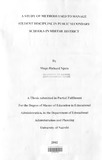| dc.description.abstract | 'Misbehaviour' in secondary schools have increased significantly during the recent years. The incidence of student misbehaviour has escalated, partly because some disciplinary techniques and practices used in schools have various short-comings, and are therefore inadequate in curbing the menace. The reasons for student misbehaviour may have as much, if not more, to do with their experiences at school as those they encounter in the home, or with aspects of their personality. Thus, through the use of appropriate methods of discipline, schools can impact a lot in controlling student indiscipline. The basic purpose of this study was to examine the methods used to manage students' discipline in public secondary schools in Mbeere District, following several reported cases of student indiscipline there. In addition, the study sought to determine the disciplinary methods which could be suitable or unsuitable in controlling misbehaviour among secondary school students. The survey involved 26 headteachers, 26 deputy headteachers, 192 teachers and 244 students. Multiple methods, namely, purposive sampling, random sampling and systematic random sampling were applied in identifying the respondents. Data pertinent to the study was gathered through the use of three questionnaires developed by the researcher, and an observation checklist. A common questionnaire was designed for headteachers and deputy headteachers. Other two instruments were developed for teachers and students respectively. Basically the instruments sought to gather information ranging from the kinds of discipline problems experienced among students, the methods used to deal with the discipline problems, the perceived causes of student indiscipline, the constraints faced in enhancing discipline among students to the perceptions of the respondents toward the suitability or unsuitability of various disciplinary methods in managing students behaviour. Validation of the research instruments was done through the use of pilot study's results. The reliability value of the instruments marked for headteachers and deputy head teachers was found to be 0.86, while that of the instruments designed for teachers and students was 0.69 and 0.63 respectively, using the Pearson Product Moment Correlation Coefficient formula. It was that: 1. The discipline problem commonly experienced among secondary school students was insubordination or rudeness to those exercising authority in school. 2. Corporal Punishment was the most commonly applied disciplinary method in dealing with cases of student misbehaviour. 3. The most prevalent causes of discipline problems among secondary school students were ill rank order social factors, inadequate communication system in schools, peer influence, and strict rules of conduct. 4. Rewarding of positive behaviour and the ridiculing of errant students were the behaviour modification methods commonly applied in the schools. 5. The disciplinary methods most frequently considered by teachers to be unsuitable as used in their schools were suspension of errant students from school and corporal punishment. On their part, students considered excessive punishment and inconsistency in administration of school rules, as well as the application of strict rules of conduct, to be inappropriate. 6. The methods of discipline most frequently mentioned as being suitable in managing student discipline were guidance and counselling, offering of rewards for positive behaviour, and the involvement of students decision making process in schools. 7. To prevent misbehaviour among students, the most preferred methods of discipline were effective communication of school rules to students and staff in school, guidance and counselling, and the rewarding of students for their positive behaviour. It is recommended that: 1. Alternative methods to the use of corporal punishment, for instance, guidance and counselling, dialogue between students and school administration, as well as provision for participation of students in decision making processes should be used more often in managing student rnisbehaviour. 2. Schools should establish effective communication forums with students, for instance, student councils, barazas and suggestion boxes in order to avoid suspicion or unnecessary hostility. 3. Teachers should be encouraged to attend seminars, workshops, and in-service courses on effective methods of managing student misbehaviour. 4. It is recommended that provisions be made for the involvement of resource persons in offering relevant advice to members of school communities. In quest to determining effective school leadership styles, it is suggested that a similar study be conducted in primary schools across Kenya. It would be significant to examine the disciplinary methods applied in these institutions in inculcating moral values among the young at his level. | en |

